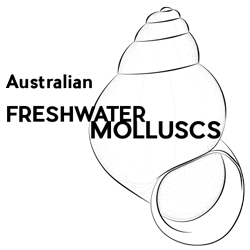
Shell elongate, valves flattened, oblong to dorso-ventrally compressed oval, posterior edge rounded with a well-defined posterior ridge, posterio-dorsal margin bluntly angled and dorsal margin anterior to beaks slopes away strongly, anterior edge rounded, ventral margin flat. Exterior of valves very dark olive, interior bluish to bronze. Exterior sculpture of valves with collabral growth lines and no traces of wrinkles. Reaches about 58 mm in length, height/length ratio less than 50%. This species differs from all other Hyridella species primarily in its very isolated occurrence in the Bloomfield River of far north Queensland – far north of the SE Australian populations of other Hyridella species and in its apparent lack of wrinkles near the shell beaks.
Hyridella aquilonalis (Iredale, 1934)
Infraclass Heteroconchia
Cohort Palaeoheterodonta
Order Unionida
Superfamily Unionoidea
Family Hyriidae
Subfamily Hyriinae
Genus Hyridella Swainson, 1840
Original name: Rugoshyria aquilonalis Iredale, 1934. In Iredale, T. (1934). The freshwater mussels of Australia. Australian Zoologist 8: 57-78 pls 3-6.
Type locality: Bloomfield River, Queensland.
The last major taxonomic revision of Australian freshwater mussels was by McMichael & Hiscock (1958).
Based on the available molecular results, Walker et al. (2014) pointed out that a reassessment of Australian hyriids is needed and one is now in progress.
Shallow burrower in silty sand/mud in streams and rivers. Suspension feeder. Larvae (glochidia) are presumably brooded in the marsupia in the gills of females and, when released, likely become parasitic on fish gills or fins where they undergo metamorphosis before dropping to the sediment as free-living juvenile mussels.
Bloomfield River, northeast Queensland.
The identity of this species needs to be assessed. Only the holotype is known from this locality, and, to our knowledge, the species has not been re-collected. McMichael & Hiscock (1958) thought that it might be related to Hyridella depressa.
Iredale, T. (1934). The freshwater mussels of Australia. Australian Zoologist 8: 57-78 pls 3-6.
Iredale, T. (1943). A basic list of the fresh water Mollusca of Australia. Australian Zoologist 10: 188-230.
Lamprell, K. & Healy, J. (1998). Bivalves of Australia, volume 2. Leiden, Backhuys Publishers.
McMichael, D. F. & Hiscock, I. D. (1958). A monograph of the freshwater mussels (Mollusca: Pelecypoda) of the Australian region. Australian Journal of Marine and Freshwater Research 9: 372-508.